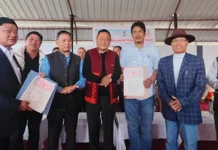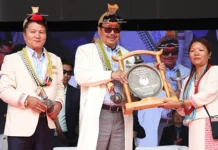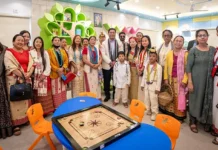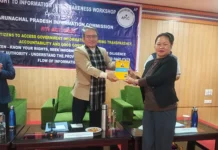NAHARLAGUN, Feb 17: Health & Family Welfare (HFW) Minister Alo Libang suggested that the “Singapore model on pain and palliative care may be replicated in the state.”
The minister, who was speaking after inaugurating a workshop on pain and palliative care at Tomo Riba Institute of Health & Medical Sciences (TRIHMS) here on Monday, also urged the participating DMOs, HoDs, doctors, nurses and paramedics to take the workshop, being conducted by resource persons from both within and outside the country, seriously.
While advocating emulating the Singapore model of pain and palliative care, the minister said although Arunachal is “a resource-crunch state which is totally dependent on the Centre for funds,” the state government would provide all possible help and support to the health sector.
Earlier, TRIHMS Director, Dr Moji Jini, threw light on the status of pain and palliative care in the state, and exhorted all stakeholders to “work collectively to address the issue in a holistic manner.”
Onco-Anaesthesia HoD, Dr Sushma Bhatnagar, highlighted the overall scenario of pain and palliative care in India, and urged the doctors and the nurses to “work with zeal and spirit to assuage the sufferings of those suffering from various life-threatening diseases.”
She suggested that “a kind of hub may be established in the capital to facilitate training of doctors and nurses serving in the remote and far-flung places of the state.”
Dr Alok Mathur from the union HFW ministry spoke on ‘Palliative care in India: Initiatives taken by MoHFW’. He lauded the steps initiated by Arunachal, saying “it was the first state in the country to take up the pain and palliative care programme implemented by the Centre.”
Singapore-based National Cancer Centre’s Senior Consultant for Supportive and Palliative Care, Dr Cynthia Goh, highlighted the myriad problems and challenges all over the world, especially in the Asian countries. She commended the state’s HFW department’s efforts to train the health workers in order to make them more efficient.
HFW Director, Dr Moromor Lego, threw light on reports of world health scenario released by the WHO, and requested all stakeholders to work collectively to improve the state’s performance in pain and palliative care.
During the technical session, Drs Goh, Bhatnagar, Tashi Chotton and Hage Sonia, and MS Julie Bage discussed palliative care, pain management, morphine prescription, management of bedsores and fungating wounds, ethics in palliative care, etc.
They informed that the goal of palliative care is to relieve the suffering of patients through comprehensive assessment and treatment of physical, psychosocial and spiritual symptoms experienced by patients.
Morphine, which is the commonly used medicine for pain relief, is an opioid medicine or analgesic that is prescribed for strong or severe pain that is no longer responding to medication of lesser strength. However, morphine should not be taken until the pain is really bad as it can be addictive if used incorrectly, they cautioned. (DIPR)




